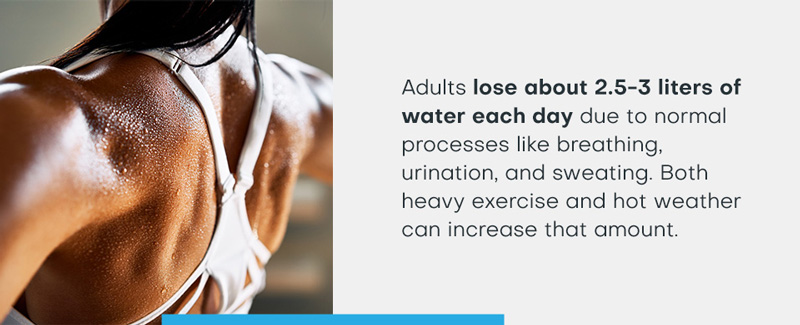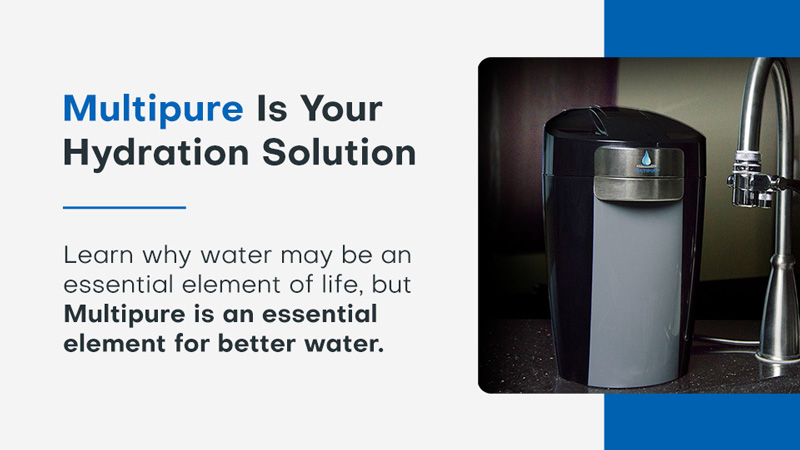The Ultimate Hydration Solution
Posted by Kenton Jones on Apr 15th 2022
Because water makes up a significant part of our bodies, it's no surprise that proper hydration is vital for a wide range of bodily functions. From corralling hunger cues to reducing the risk of illness, water is nothing short of critical for feeling your best and maintaining your health.
But not just any water will do — popular sources like tap water and bottled water can be contaminated and have harmful environmental effects. Additionally, you must make sure you aren't only getting your water from soda or juice.
So, how do you make the best choices for yourself and your family when it comes to water intake?
The Importance of Water
Most people know that water is important. Here are a few specifics about the importance of water:
- Cognitive function: Studies have shown that even moderate increases in water can improve various cognitive functions, like mood, energy, attention, and fatigue.
- Digestion: Without water, you can experience constipation, as the large intestine pulls water from your food waste, making it harder for stool to move through the body. Further, water plays a role in other elements of digestion, like using soluble fiber, breaking down food through saliva and stomach acid, and helping absorb nutrients.
- Appetite: Upping your water intake is a common part of weight management plans. It's a well-studied natural appetite suppressant that helps us avoid overeating — and mistaking thirst for hunger. Plus, water can regulate and stimulate your metabolism.
- Moisture: Staying hydrated keeps certain types of tissues, such as in the eyes, nose, mouth, and skin, from getting dry. It also keeps our joints well-lubricated so they can work properly.
- Waste removal: This liquid serves as a natural detoxifying agent by supporting the kidneys as they remove toxins. It can flush out products like excess sugar and caffeine and keep the blood vessels open for better nutrient delivery throughout the body. Experiencing dehydration can be especially damaging for the kidneys, potentially contributing to kidney stones, urinary tract infections, and a build-up of wastes.
- Temperature regulation: Because sweat can control body temperature, and we sweat less when dehydrated, dehydration can lead to heat exhaustion, stroke, or heart issues for some populations.
- Heart health and blood pressure: Staying hydrated helps your body pump blood more efficiently, keeping your heart rate and blood pressure normal. By preventing sodium retention, water also helps your blood stay thin for better circulation.
Simply put, water is the cornerstone of how our bodies function and can help us avoid ailments like headaches, heart problems, high blood pressure, and arthritis.
Dehydration and Water Deficiency
Adults lose about 2.5-3 liters of water each day due to normal processes like breathing, urination, and sweating. Both heavy exercise and hot weather can increase that amount. While people often mistake increased thirst for hunger, dehydration can also suppress feelings of thirst, exacerbating the problem. This issue negatively impacts you physically and mentally. It can dull your senses, reduce your response time, and even make you feel hungrier.

Some signs of dehydration include:
- Dark urine
- Dizziness or lightheadedness
- Weakness or fatigue
- Constipation
- Dry mouth
- Headache or confusion
- Slow response times
- Muscle cramps
- Heat intolerance or chills
- Irritability or anxiety
One of the easiest ways to tell when you're dehydrated is to check the color of your urine. Ideally, it should be a pale yellow, but when it's dark, you may not be drinking enough fluid. Keep in mind that some medications can affect urine color — B vitamins, for example, can make it look bright yellow.
Another simple way to check is to do the skin turgor test. Use two fingers to pull back the skin on your lower arm for a few seconds. When you release it, it should quickly snap back into its normal position. If you're dehydrated, it may stay "tented" and move back more slowly.
Why "Eight Glasses of Water a Day" Isn't Enough
The old adage that you need to drink eight glasses of water a day is a handy rule, but it needs more nuance. The type of water you drink makes a difference, and your body may need more or less depending on your size and what kinds of activities you're doing.
In general, aim for half of an ounce to 1 ounce of water a day for each pound you weigh. For many people, this number comes out to much more than eight glasses — usually considered 8 ounces — especially if you're trying to stay as hydrated as possible. If you're more active, lean toward 1 ounce per pound.
Many people also incorporate drinks like juices, teas, coffee, sports drinks, and soda into their diets. Most of those drinks contain high levels of sugar and caffeine, which both act as diuretics, meaning they increase the production of urine and cause the body to flush out more fluids. Therefore, they contribute to the overall water loss that you experience every day. If you want some extra flavor in your water, try a splash of lemon juice or fruit infusions.
The belief of drinking any beverage as an adequate substitute for water is not a good enough solution. The only proper answer is to drink water — and not just any water, but cleaner, healthier water, free from contaminants, and free from chemicals. That can be difficult when you turn to the tap or bottled water. These water sources often come with a few crucial issues:
- Tap water: Many people shy away from tap water due to the taste, depending on the local water makeup, but it can also contain many contaminants. Some are harmless, while others can potentially cause cancer or other adverse effects. While the Environmental Protection Agency (EPA) has some limits in place, the events of Flint, Michigan, and other concerning reports tell us that these may not be adequate or well-enforced. You can even search reports for your area on the Environmental Working Group's (EWG) website.
- Bottled water: Bottled water has its own set of marketing problems, with some manufacturers simply repackaging tap water. One study testing water from 11 different bottled water brands found that 93% of it contained microplastics, with an average of 325 plastic particles found in each liter of water sold. Water bottles are often made of polyethylene terephthalate (PET), a possible endocrine disrupter that affects hormone systems and can seep into the water.
By filtering your water in your home, you get the convenience and low cost of tap water without the dangerous effects of plastics that come with bottled water. It tastes great, and a quality filter can remove dangerous contaminants for clean water that you can feel good about consuming. While it's important to stay hydrated, it's also vital to drink water that won't cause more problems in the future.
Multipure Is Your Hydration Solution
Water filters can be made of different materials, but Multipure solid carbon block filters treat the widest range of contaminants, as tested and verified by NSF. These filters can treat over 85 different contaminants, including lead, chlorine, volatile organic compounds (VOCs), and disinfection by-products (DBPs). Notably, they can also treat polychlorinated biphenyls (PCBs) and the "forever chemicals" perfluorooctanoic acid (PFOA) and perfluorooctanesulphonate (PFO), which are particularly tough to remove.

Solid carbon block filters use three different processes for comprehensive filtration in one device. These filters are highly versatile, and we utilize them in our under-sink and on-counter drinking water systems. All of this comes at a lower cost, too — with Multipure, you get clean water for just pennies a gallon.
Discover Multipure's Hydration Solution, and learn why water may be an essential element of life, but Multipure is an essential element for better water.

